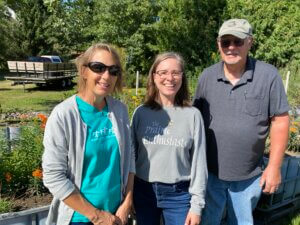Prairie Enthusiasts work for ecological diversity
June 8, 2024
| By La Crosse Community Foundation |
Preserving prairie lands

The Prairie Enthusiasts, including Executive Director Debra Behrens (center), are known for accomplishing their work through relationships with volunteers, private landowners and other private and public conservation groups.
In today’s world of rapidly changing landscapes, where concrete and steel often take precedence over green fields and blue skies, The Prairie Enthusiasts stand firm and committed as ever to maintaining the driftless region’s ecological diversity, which sometimes seems teetering on the edge of memory.
Their work is crucial because preserving prairie lands preserves biodiversity, supporting a myriad of plant and animal species, and offers essential ecological services like carbon sequestration, water filtration, and soil health improvement. These benefits are important for environmental health, climate change mitigation, and sustaining agricultural and economic activities that affect everyone.
Debra Behrens is executive director of The Prairie Enthusiasts. It’s an organization that thrives due to the work of numerous volunteers and its cooperative work with private landowners and other private and public conservation groups to accomplish its mission.
Why is it important to all of us to conserve the prairie and its ecosystems?
For thousands of years, the Upper Midwest was abundant with prairies and oak savannas that evolved to depend on fires, most of which were ignited by Indigenous Peoples. With the arrival of Europeans, this once vast landscape was almost entirely lost to the plow, lack of fire, introduction of non-native species and development pressures. Today, only a tiny fraction remains.
These ecosystems are as ecologically diverse as a rainforest, so when they’re lost, an abundance of life is lost with them. We need to act now before more of these habits slip away. When we have an active community of people caring for the land, we can save threatened and endangered species like the monarch butterfly, rusty patched bumblebee and many more who rely on prairies for their survival.
How does your organization engage and build relationships with local community members to promote conservation efforts?
The Prairie Enthusiasts is made up of 11 regional chapters throughout Wisconsin, Minnesota, and Illinois. These chapters are the foundation of our grassroots community of learners and doers, sharing insights, practices and inspiration with one another. Our goal is to inspire people to move beyond being an observer of nature to become stewards of the land. We connect people to Prairie Enthusiasts chapters near them to join in work parties, where they collaborate to remove invasive plants, bring prescribed fire back to the land, and collect prairie seed to restore habitat. The Prairie Enthusiasts also provide opportunities for people to learn more about rare ecosystems around them through field trips, workshops, an annual virtual conference and our publication, The Prairie Promoter.
How is climate change affecting prairie ecosystems, and what measures is your organization taking to mitigate these effects?
Fire-dependent ecosystems are some of the most climate-resilient habitats. Native plants of the Upper Midwest have adapted for millennia, adjusting to the extremes of cold or hot, wet or dry. The deep roots of prairie plants safeguard them against drought as well as fire. However, no ecosystem is immune to the effects of climate change. In prairies, we see an increase in the presence of non-native species, which can crowd out native plants.
The best way to mitigate the effects of climate change is to restore the use of prescribed fire on the land. Fire reduces populations of non-native plants as well as removes the build-up of thatch, which, over time, can create even hotter fires or prevent native plants from sprouting up. The Prairie Enthusiasts actively conduct controlled burns on our owned land, privately owned lands and assist other organizations with controlled burns.
Reprinted with permission from the La Crosse Tribune.
